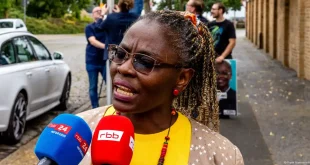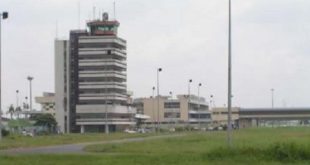Douala (AFP) – Dawn breaks in Cameroon’s economic hub, the seething metropolis of Douala, and a crowd gathers at the water spigots by the Guinness brewery in the run-down district of Bassa.
They fill up jerrycans and canisters from the only dependable local source of water — a borehole installed by the brewery itself in the absence of a reliable state supplier.
People load up car trunks, motorcycle taxi luggage racks or else balance containers on their heads.
The hole is one of a huge number of privately-owned wells which dip into the water table in this region of four million people.
But lack of regulation has led to chaos, raising questions as to whether the precious resource can be sustained or remain drinkable.
Overconsumption and pollution of the planet’s limited supplies of freshwater lie at the core of a three-day UN Water Conference opening in New York on Wednesday.
Boreholes everywhere
Cameroon’s water problems are clearly big, according to anecdotal evidence, but there are few figures to give statistical depth.
The government says the public water utility Camwater serves a “majority” of households — but does not offer figures, or even an estimate.
Not far from Bassa, in the PK12 district, two machines are hammering away on a corner of land wedged between buildings, making the ground shake.
Boring into the ground to reach the aquifer requires copious amounts of lubricant, in the form of water pumped in by teams at the surface and a chemical additive called Polyfor.
Care has to be taken to avoid polluting the supply, said Serge Diffo, who runs the small drilling company, Hydyam.
But, he said, “you see septic tanks right next to boreholes in residential blocks.”
Wells drilled for individual use do not need any prior authorisation, a practice that verges on heresy in typical urban planning.
Hygiene fear
“Every person, in line with what he can afford, simply drills one or more wells without bothering to pay attention to anyone,” said Firmin Bon, a professor of hydrology at Maroua University.
A borehole typically costs at least a million CFA francs (around $1,600) in a country where the minimum wage is 41,875 francs.
“The density can come close to 100 boreholes per square kilometre (250 per square mile),” said Bon.
“They are sometimes in contact with sources of pollution, latrines and sewage.”
He predicted, at best, a rise in cases of gastroenteritis or, at worst, cholera — and, in the long term, cancer.
In the nearby but better-off valley of Logbessou, villas are fitted out as far as the eye can see with water tanks in the form of massive but unsightly black, grey or blue plastic water butts which store water from boreholes.
A study published by the Pan African Medical Journal found that in 2018, two-thirds of households in Doula’s fifth district were consuming water drawn from boreholes. Half of the households were more than a 15-minute walk from a source.
The country’s deputy minister for water, Hamadou Youssoufa, described the situation in Douala as “a concern,” and blamed it on runaway urban development and a population explosion.
He said the ministry was carrying out a study into the hygiene of the boreholes, which “will be useful for requiring consumers to uphold the standards.”
Scepticism
President Paul Biya, Cameroon’s iron-fisted ruler for the past four decades, acknowledged in his New Year’s address that the water problem in Douala was one of his “main concerns.”
He said the government had been asked to launch a “mega-project” this year to supply drinking water to the city and its environs.
But Francois Songue, a 75-year-old pensioner, has grown tired of such promises over the years.
“In my part of town you have to wait for water from Camwater until two in the morning — and it doesn’t come!
“I’ve travelled more than 10 kilometres here to get drinking water for my wife, my children and myself,” he said as he stood in line at the Guinness site.
Jodelle Foguem, a young housewife, said she trusted the water that came from the brewery’s taps.
“The water is not drinkable in our parts of town. We prefer to come and get it here,” she said.
© 2023 AFP
 CameroonOnline.org Cameroon news, Actualité Camerounaise, live Web TV & Radio, World News and a lot more
CameroonOnline.org Cameroon news, Actualité Camerounaise, live Web TV & Radio, World News and a lot more





For the benefit of intellectual honesty, Dictator Biya should apologise for deceiving citizens of LRC that that sh*thole country MUST emerge LATEST in 2035.
The truth of the matter is that all indicators point to the fact that LRC can and will NEVER EVER emerge by 2099 let alone by 2035. Basic utility such as potable water is still considered as gold in that God-forsaken country.
LRC is ruled by CRIMINALS who use deceit, deception and terror to hold the citizens as prisoners.
Thank ALLAH, Ambazonians have risen to fall no more.
GENUG IST GENUG.
BYE-BYE LRC; BAKASSI OIL HERE WE COME!!!!